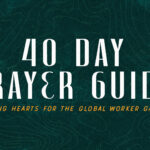
Pray With Us for Olivia
Comments Off on Pray With Us for Olivia“Declare his glory among the nations, his marvelous works among all the peoples!” —Psalm 96:3 (ESV) Olivia is part of an effort to plant churches...

“Declare his glory among the nations, his marvelous works among all the peoples!” —Psalm 96:3 (ESV) Olivia is part of an effort to plant churches...

“And what you have heard from me in the presence of many witnesses entrust to faithful men who will be able to teach others also.”...

“And how are they to preach unless they are sent? As it is written, ‘How beautiful are the feet of those who preach the good...

“Let each of you look not only to his own interests, but also to the interests of others.” —Philippians 2:4 (ESV) Britney and Micah have...
Ruth 1: Ruth chooses to stay with Naomi after the death of their husbands and returns with her to Bethlehem in loyalty and faith. Acts 26: Paul testifies before King Agrippa, recounting his conversion and mission to preach Christ, urging all to believe in Him. Jeremiah 36: Jeremiah dictates God’s words to Baruch, but King Jehoiakim burns the scroll, prompting God to command it be rewritten with added judgment. Luke 5: Jesus calls His first disciples, heals a leper and a paralytic, and teaches about forgiveness and new life in Him.

“And let us consider how to stir up one another to love and good works.” — Hebrews 10:24 In Nairobi, Kenya, Matthew and Rebekah Caye...

“The light shines in the darkness, and the darkness has not overcome it.” —John 1:5 (ESV) In a place marked by both religious skepticism and...

In this episode of the Sermon Notes podcast, Jay Strother kicks off a special August series focused on global missions by sitting down with Winston and Emmy Coltart, global workers serving in Zimbabwe. The conversation explores their remarkable journey from meeting on a short-term mission trip to planting a church and opening a gospel-centered coffee shop near a university in Zimbabwe.
Judges 19: A Levite’s concubine is abused and murdered in Gibeah, leading him to send her dismembered body throughout Israel as a call to action. Acts 23: Paul defends himself before the Sanhedrin, survives a murder plot, and is transferred under Roman protection to stand trial in Caesarea. Jeremiah 33: God promises healing, restoration, and a righteous King from David’s line, reaffirming His eternal covenant with Israel. Luke 2: Jesus is born in Bethlehem, announced to shepherds by angels, presented at the temple, and grows in wisdom and favor with God and people.

“And I am sure of this, that he who began a good work in you will bring it to completion at the day of Jesus...
Judges 18: The tribe of Dan steals Micah’s idols and priest, then violently takes over the city of Laish and sets up their own idolatrous worship. Acts 22: Paul defends himself before a hostile crowd by recounting his conversion and calling, revealing his Roman citizenship to avoid unlawful punishment. Jeremiah 32: Jeremiah buys a field as a prophetic sign of future restoration, even as Jerusalem faces destruction, affirming God's power and covenant promise. Luke 1: God announces the miraculous births of John the Baptist and Jesus, and both Zechariah and Mary respond with praise as God's redemption plan unfolds.

“As each has received a gift, use it to serve one another, as good stewards of God’s varied grace.” —1 Peter 4:10 Leon and Ellie...